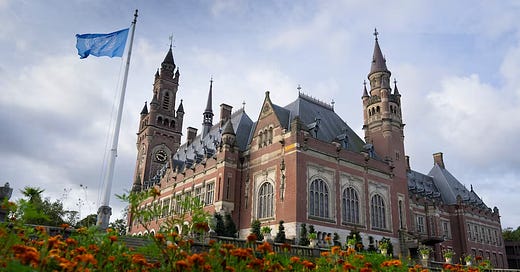Breaking : ICJ Directs Israel to take "all measures" to Prevent Genocide in Gaza
Exclusive Analysis and Key Points Culled from the Lengthy Court Order, using AI. What next, given lack of enforcement mechanism and ongoing negotiations.
Verdict of the International Court of Justice is Out
THE HAGUE, January 26 – In a momentous interim decision, the International Court of Justice (ICJ) has today issued an order for Israel to undertake “all necessary measures” to avert acts of genocide amid the ongoing conflict in the Gaza Strip. This significant ruling, with a 16-1 vote, occurs as the Court continues to deliberate on a case initiated by South Africa, which accuses Israel of genocide in Gaza – a process that could extend over several years. Uniquely, the Court’s usual panel of 15 judges was expanded to 17 for this case, including additional judges from South Africa and Israel. Representing India on this panel is Justice Dalveer Bhandari, a former Judge of the Supreme Court of India.
The Key Points of the Order
The key points exacted by “The KBS Chronicle” from the Court’s ruling, using the latest AI tools, are summarized below.
The International Court of Justice at The Hague has issued critical interim directives to Israel.
Key directions include:
Prevention of Genocidal Acts: Israel is required to take all necessary steps to avert any actions that could be interpreted as genocidal. This encompasses avoiding killing or causing bodily harm to group members, and preventing conditions that could lead to a group's destruction or inhibit births within it.
Military Conduct: The Israeli military must ensure that it does not engage in any acts that could be classified as genocide.
Curbing Incitement: Israel is tasked with both preventing and punishing any public statements that might incite genocide in Gaza.
Humanitarian Access: Ensuring uninterrupted humanitarian aid and access is a crucial part of the court’s orders.
Preservation of Evidence: There is a mandate for Israel to safeguard any evidence that could be pivotal in a genocide case and to prevent its destruction.
Reporting Compliance: Israel is to submit a report to the International Court within a month, detailing the measures implemented in adherence to these directives.
Additionally, the Court has expressed grave concern over hostages held by Hamas, calling for their prompt release.
Binding Verdict, but no Enforcement Mechanism within UN
The ball is now in Israel's court (pun intended) regarding how to respond to these directives. Although the ICJ's decisions are obligatory, they lack a direct enforcement mechanism. This leaves room for Israel to potentially disregard the Court's instructions. Nevertheless, considering the ongoing diplomatic negotiations focusing on a potential two-month ceasefire and the efforts to enhance aid distribution in the Gaza Strip, Israel might contend that it is already undertaking actions in line with the court's expectations. “This development could potentially influence public opinion in the United States, which is on the verge of a critical Presidential Election. The Israel-Hamas conflict has already polarized opinions across the nation, from university campuses to Town Hall Meetings linked with the electoral campaigns and other related discussions”, said our Founder and Chief Editor, KBS Sidhu.
Analysis of the Order
Court’s Directive amid Continuing Conflict
The Court’s directive demands that Israel ensure its military operations do not lead to genocidal acts and calls for immediate steps to improve the humanitarian conditions for Palestinians in Gaza. While the Court has not yet concluded— as the detailed case hearing will continue— if genocide has occurred in Gaza, it emphasizes the protection of Palestinians from potential genocidal actions.
Israel’s Stance and the Court’s Limited Ruling on Ceasefire
In response to the charges termed 'spurious' by Israel, the ICJ stopped short of demanding an immediate ceasefire, an element of the decision likely to disappoint South Africa and Palestinian advocates. The Court's an overwhelming majority ruling from its 17 judges underscores the necessity for Israel to avoid actions that could harm Palestinians physically or mentally or impede their population growth.
Awaiting a Final Verdict: Provisional Measures for Protection
The Court's final decision on the genocide allegation may take years, but the interim measures aim to safeguard Palestinians during the deliberation. These include preventing genocidal acts, barring incitement to genocide, ensuring humanitarian access, and prohibiting the destruction of potential evidence in a genocide case. Israel is required to report compliance to the court within a month.
Israel's Likely Response in Light of Diplomatic Efforts and ICJ Rulings
Given that ICJ rulings are binding yet lack a formal mechanism for enforcement, the response from Israel cannot be predicted with any degree of certitude. Ongoing diplomatic initiatives are focused on achieving a two-month ceasefire and enhancing the flow of aid into Gaza and release of hostages. These efforts place Israel's compliance with the ICJ's measures under close observation. “The Washington Post” reports that the U.S. President is planning to depute CIA Director William Burns on a multi-country mission aimed at bridging the gaps in the nearly finalized ceasefire agreement, facilitated by intermediaries such as Egypt and Qatar. A key point in the negotiations, notably, includes the release of all hostages. The impact of the ICJ's recent order on these developments is yet to be determined – whether it will accelerate the agreement's finalization or lead to a more rigid stance in Israeli negotiations.
Background of the Case
Background of the Case: South Africa’s Allegations and Israel’s Defense
The case initiated by South Africa at the ICJ centers on allegations of Israel's military campaign leading to the significant destruction in Gaza and a high Palestinian death toll. Israel, asserting its right to self-defense and adherence to international law, had urged the court to dismiss the case. The ICJ's emergency measures reflect its serious view of the allegations, underscoring the gravity of the ongoing conflict.
Summing Up: The Impact of the World Court's Ruling
Today’s ruling by the World Court signifies a significant moment in the longstanding conflict between Israel and Palestinian factions in Gaza, heralding a new era of international engagement in issues of alleged genocide and humanitarian crises. The directive not only casts Israel in a diplomatically challenging position but also elevates South Africa's status on the global stage, particularly in contrast to the silence of many Arab nations. This development is observed with cautious optimism, as it could sway public opinion in the United States, a nation already deeply divided over this conflict.
The ruling is anticipated to act as a catalyst in the ongoing negotiations for a ceasefire. Amidst a severe humanitarian crisis in Gaza and the tragic loss of civilian lives and property, this directive from the World Court could serve as a critical stepping-stone, if not a cornerstone, towards a sustainable and immediate resolution, paving the way for a long-term solution. As the world watches, there is hope that this significant intervention will bring about a much-needed point of inflexion in the trajectory of this enduring conflict.







ICJ lacks enforcement mechanism. Saudi ‘s ,Qataris and the rest of the world is so euphoric but nothing is going to change in Gaza. Everyone knows it. Sad indeed !
At last, a step in the right direction. How effective would it be is anybody’s guess.